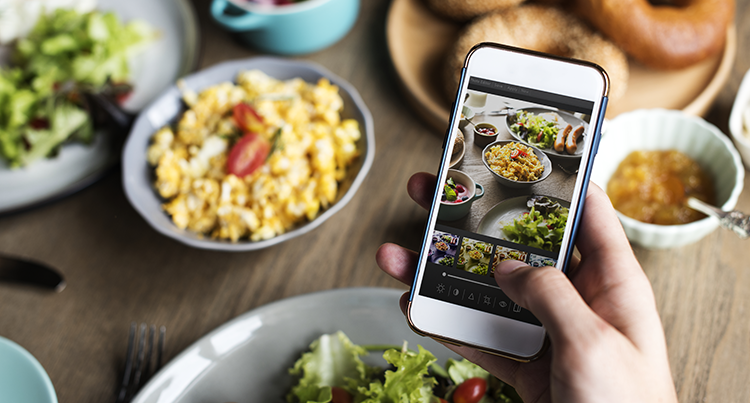Influencer marketing is a pretty simple concept to explain: there are influencers, and there are brands.
The influencers are popular on social media platforms, such as Instagram, Facebook, YouTube, and Twitter, and can reach thousands of people with a single post.
The brands are the products and places you know and love, such as Nike, Hyatt, Paris and Moet and Chandon.

You’ll see tons of fashion brands promoting themselves through fashion bloggers. But the hospitality industry can also benefit from this type of marketing. The good news is that all influencers, regardless of their niche, travel. You can target any influencer and you’re guaranteed to reach their audience because people like seeing where their favorite social media stars spend their days.
Check out how Kino MacGregor, an Instagram influencer with over 1 million followers, promotes a hotel in Bangkok. She is a yoga teacher and she travels a lot, so her collaborations with hotels and restaurants not only benefits her but the brands too.
But how does this type of marketing benefit the brands? Here are some pros and cons of developing an influencer campaign for your hospitality business.
The pros
1. More engagement and trust
A Collective Bias survey showed that 30% of consumers are more likely to buy a product promoted by a non-celebrity blogger than a celebrity. Why? Social media influencers may be famous, but they are not “real” celebrities. They are just like normal people, conveying their normal lives through social media.They do small talk, they communicate with their audience, and they share random moments of their day. They come across as real people. That’s why we trust them more, and that’s why people engage with them more.
2. Better organic reach
An influencer isn’t Gisele Bundchen filming a glamorous TV commercial for a hotel. It’s someone sharing their real-life experience with a business or product, with their audience.
This kind of promotion feels more realistic, which is why it has a better organic reach. If Kino MacGregor has more than 1 million followers, it means that her posts and stories reach these people without the need for searching for it. It simply appears in their ‘news’ feeds.
3. Research target audience through influencers
Do you want to attract young people to your German hotel? Start with finding an influencer who targets your audience. Dasha_sky, for example, would be a good partner for such a business.
If you want to attract young people in their 30s in to a pub in Dublin, you can find beer lovers with plenty of followers on Instagram and YouTube.
When you develop a collaboration with relevant influencers, you gain exposure to your target audience. Through the comments and likes on the influencers posts, you can clearly see what your audience like and don’t like.
4. Traditional advertising is less effective
Traditional online ads are not as effective as they used to be. One recent survey showed that nearly half of people now use ad blockers, only 7% of the respondents viewed ads positively, and over 30% genuinely disliked online ads.
Since influencer marketing is not like a traditional ad, people don’t have much against it. It’s content and they are willing to engage with it.
5. People love visuals
As you develop your brand’s social media pages you’ll definitely feature visual content. But influencers already have tons of that type of content on their pages and they’ve managed to attract an audience with it. Let them do the hard work for you - they can work as a medium for your business.
The cons
1. The content feels less genuine
Social media users are pretty much aware of the fact that influencers don’t pay for the hotels and restaurants they promote. Although the content appears more genuine than an actual ad, it still doesn’t feel like an entirely honest recommendation.
2. Limited to social media platforms
An ad will get you onto Google. It will also get your business featured on relevant websites, such as TripAdvisor. An influencer cannot do that for you.
That doesn’t mean that an influencer marketing campaign won’t be successful; it just means that such actions do not exclude the need for more traditional types of promotion.
3. You have to research... a lot
The most popular influencers from your niche will most likely already have connections with other businesses, and the contracts are usually exclusive. If you own a restaurant in Thailand, you won’t be able to work with an influencer who promotes a competitive business.
So be prepared to dig into the online world, looking for good influencers to rely on.
4. You could face legal repercussions
The aim for that “genuine” feel may lead you in the wrong direction. Influencers must never promote products and services while making their audience believe they paid for it when that content is actually sponsored.
The sad truth is that most influencers fail to provide clear exposures. Such actions are slowly coming to an end since the Federal Trade Commission sent out 90 letters reminding influencers that they should clearly and conspicuously disclose their relationships when promoting or endorsing products.
5. Potential damaging results
Let’s say you connect with a somone who also happens to be a social media influencer. You invite them to stay at your hotel for free and you make a deal for them to promote it through their social pages. But they are also a hunter, which means there’s a good chance you’ll face the rage of animal rights advocates if you associate your business with them.
If the influencer is attracting any kind of hate in the online world, they will transfer that hate to your business. That’s why it’s necessary to do your research well and check the background of the person you plan to engage with.
.png?width=954&name=Typsy%20%20We%20teach%20hospitality%20to%20the%20world%20%20typsy.com%20blog%20banner%20_%20(1).png)
Can a brand in hospitality survive without influencer marketing? Sure! It’s a choice and it’s yours to make. But you have to be aware of the pros and cons of influencer marketing before you make the decision.
Start your online hospitality training with Typsy, and watch our course on Social media for businesses.
 |
Bryan Brumfield is a full-time content marketing associate at Best Essays AU and a part-time blogger. His roots are in North Carolina, but his soul belongs in California. Bryan’s favorite pastime is playing chess and lip-syncing Rihanna’s songs. Check him out on Twitter. |
You might also like: